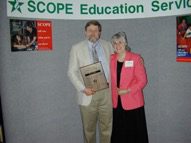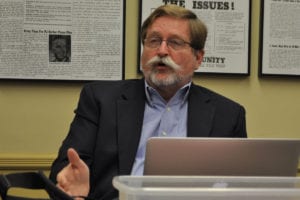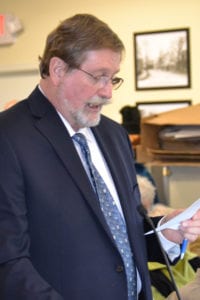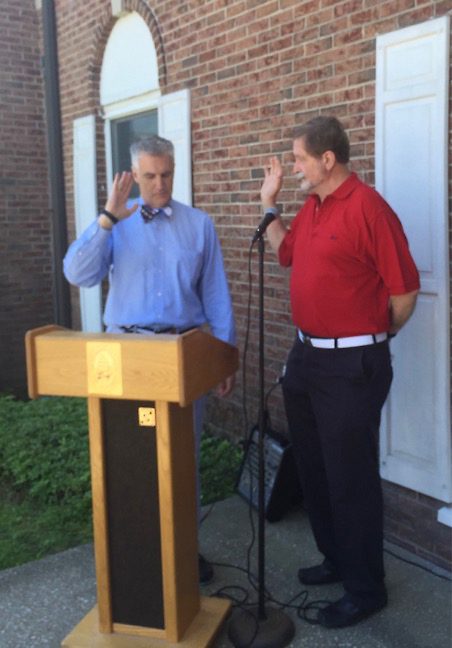One-on-one with Bruce Miller
Port Jeff village trustee on his role in tackling the big projects
By Raymond Janis
Village of Port Jefferson trustee Bruce Miller has taken on several big projects throughout his time in office.
TBR News Media had an opportunity this week to catch up with him for an exclusive interview. In this interview, Miller addresses his background in education, the East Beach bluff, his preference for architecture and more.
What is your background and why did you get involved in local government?
I was always a believer in public service. I got that from my parents, who also felt the value of contributing. I was drafted into the Army in ’66 and left as a sergeant with honorable discharge. I am a 2nd vice commander of the American Legion post in Port Jefferson Station.
I got an excellent education from Stony Brook University. From there, I became a public school teacher in special education. While I was doing this, I also volunteered at my daughter’s school. I was on the [Port Jefferson] school board for 12 years, a president, vice president, and a budget and technology chairperson.
I was a teacher that understood board politics and the requirements of training teachers. I was the driving force in moving the district from what I would consider mediocre in this region to a nationally ranked school district. We achieved a level of 34th in the nation, according to a Washington Post survey, and this drove up our real estate values. We were number one for several years in New York state with real estate appreciation and one year we were near 10th in the nation. And this is not me saying this, but The New York Times saying this. I had a very successful run during my 12 years on the school board.
I have been working for about 30 years on the conservation and advisory committee. I was for a while the trustee liaison to that committee. It used to be a board and I would like to see that happen again.
There’s a lot more, but maybe I can speak to them through some specific questions.

Photo courtesy of Miller
How has your background as an educator shaped your approach as village trustee?
There are two aspects to my educational background: my teaching background and my school board background. As a teacher, I was a public servant and of course the village board is a public office. In teaching, you know there are budgets to deal with and priorities to be set. As a school board member, again you’re dealing with budgets. I dealt a lot with technology, doing what I thought was forward looking and I found that I could better express myself in bringing excellent technology to the school district in Port Jefferson.
Because of my educational background, and by working hard in this effort, we brought really excellent education and technology to the district. Budgets are another aspect. You have to be able to fund these things, and in a public forum you need to be able to get support from the public. You need to be able to persuade people that you have a vision, whether it’s in the school district or the village.
What are the most critical issues facing the village?
Critical has a number of meanings, one of which is that something is happening now and you have to do something about it. In that context, something is happening now: Our [East Beach] bluff is eroding and we have to do something about it.
We can either let the country club slide into the Long Island Sound or we can take measures to remediate. You have the country club above and the beach below. I voted for a rock wall that would preserve the beach and access to the beach. There is another, larger plan that we are still looking at that involves driving steel sheeting in front of the country club. We’re within literally a couple of feet of losing the tennis courts and they are going. New plans have to be made for them.
The question is do you go for the steel sheeting or do you let nature take its course? I’m not decided on that at this point. One of the things I respect about the village is that we have a lot of intelligent people who bring a lot of knowledge and background. In the few discussions we’ve had over Zoom, there were suggestions that were very positive that were an alternative to the steel sheeting suggestion.
I have been emailing the board for a very long time regarding the fact that a) we should have a public hearing on this, which is not going to happen; and b) that we should be permitting the residents to vote on a bond. We’re talking about $10 million total on this project and they should decide what they want and we should be listening to all the viewpoints. We should be more open and transparent in terms of solutions and alternatives.
We’re also losing revenue on the power plant. Over a number of years, we’re going to lose 47% of the revenue and we’re more than halfway through that process. Obviously, the businesspeople are going to see more in taxes because we’re receiving less from an alternate source. In my opinion, we need to rebuild with quality, so that you have a magnet for Port Jefferson, for the business community.
A lot of people come to Port Jefferson because it’s different. It’s a real village with a history and people like that. We should be emphasizing that history. We also need to focus on green energy. We need to do as much as we can. By doing this, bring more revenue into the village, the school district, the fire department, the library, etc.
How would you like to preserve what you call the New England heritage within the village?

We’re already doing some of that. We have what we call the Roe House, which is on Barnum Avenue. This is from the Roe family. It’s an authentic, prerevolutionary, colonial structure. We have a number of exhibits within the Roe House that point to our history.
We often call it the Setauket Spy Ring, but Port Jefferson was also part of this history, the Roes are a part of this history. We have this heritage, it’s important, and we are emphasizing it. We’re going to see an upgrade in the status of the building. It now has a historic designation and we’re going to see more of that.
How has the village changed from the time you took office and what measures have you taken to guide those changes?
There’s been an awful lot of change in regards to uptown development. When I first came into office, this was in the project stage. Now we’re seeing stuff rising above the ground and a number of properties that are either approved or well along in the approval process. There’s a former fish restaurant [PJ Lobster House] on North Country Road and 25A. The restaurant has moved downtown and they’re beginning the demolition phase.
We’ve seen a project on Texaco Avenue that has been completed, two other projects at the foot of Main and Broadway completed. Another project where a former carpet store, Cappy’s Carpets, used to be has been completed and occupied.
There are a lot of problems with flooding in Port Jefferson, a lot of hills. Everything runs down into the lower Port area. I’ve been talking about mixed surfaces, not just hard pavement, which contribute to the velocity of the water. We’re making some progress with that by having water gardens.
We have developed our parks, which I think are very attractive. We have a Dickens Festival that draws people into the village, which of course the merchants love. It’s really an excellent festival, voted best festival on Long Island several times. Every year it gets a little better.
When I was in the school district, the motto was: “Excellent at getting better.” I want to achieve that and live up to that. When I’m in the village, I want to see excellence. I have had battles over architecture. I want it to be excellent, to improve the village, and to attract more people to the village.
You have an upcoming meeting with representatives of the Long Island Rail Road. Could you preview that meeting?When I was in the school district, the motto was: “Excellent at getting better.” I want to achieve that and live up to that. — Bruce Miller
It’s about a vision, about looking at a need, seeing an alternative to the present situation, and advocating for that.
A lot of this is about developing networks and relationships. I’ve met with Phil Eng, the former LIRR chairperson, under the context of a better ride. It’s a long ride to Manhattan for a lot of people who commute. Out of necessity, it requires a transfer either at Huntington or Hicksville because you cannot take a diesel engine into Manhattan. The future is a better ride into Penn Station, but also a better ride into Grand Central Station, which will be a possibility in the future.
This requires electric energy and how do you get that? Obviously a third rail is a possible solution, a very expensive solution. My comments to Mr. Eng and his associates have been, “By the way, we pay taxes too.” There was a time when the Ronkonkoma line, which has a decent ride, was diesel, but they electrified it. So is it our turn? This is what I’ve been advocating for.
We want to get our foot on the ladder. We’re kind of standing at the bottom of the ladder watching everybody else go by. We want to get on the ladder and then move upward. On [May 31], we will be meeting with the Long Island Rail Road planning people to discuss the future and the possibilities. We will be discussing the schedule, we will be discussing a second track, we will be discussing a third rail, battery electric, and moving the LIRR station in Port Jefferson. Basically they would move the station and the rail yards west and eliminate the crossing in Upper Port, which would do a lot for traffic.
I work on big projects and these are not accomplished in six months or a year. It takes several terms, but if you achieve these goals, they are very positive for the residents of the village.

In your opinion, how can residents play a more active role in decision-making?
I had mentioned the country club and participation on the part of the residents in terms of a public hearing and being able to vote on major issues that affect them. I believe we should have more participation in this area.
During COVID, we had board meetings on Zoom. Now we have public meetings where the public attends, but we’re not having meetings on Zoom. Some of the people I know in the village who are infirm or who have particular medical issues that prevent them from attending public meetings are kind of shut out of the process. I am pressing, and will continue to press, for public meetings upstairs in the Village Hall, but also a component on Zoom where people can not only look in but participate as we had done during the COVID era.
I think that would be a very important step forward. I have just learned that Riverhead is going to be doing this and there are a number of other communities on Long Island that do this. In the past, people who are not comfortable going into public places were shut out, unable to participate. Now they are shut out again and I believe we should be supporting them.
Is there anything else that you would like to say to our readers?
As I said, I’m a person that works on big projects. I like to be a team member, but there are also certain times when you have to go against the grain. My belief is that I am an independent trustee. I’ve worked hard for the village and the school district. Also, in between my village and school district experience, I co-founded a grassroots committee to repower Port Jefferson.
I’ve worked with legislative leaders at all levels — town, village, county, state and congressional people as well. I believe that I have a vision. I have demonstrated in the past that I have executed on that vision and I want to continue to serve. I believe in service, I believe in giving back. I’m not wealthy, but I’m comfortable. I have time and I would like to contribute.
Green energy is very important to me. Making the village affordable is a very high priority for me. Transportation has become a high priority. I believe I have the vision and the energy and the diligence to work on this. I think the village needs a voice that will stand up and say, “No, this is not right.”
I am a very positive person, a very optimistic person, and I believe I take this optimism and enthusiasm to the work that I do.







